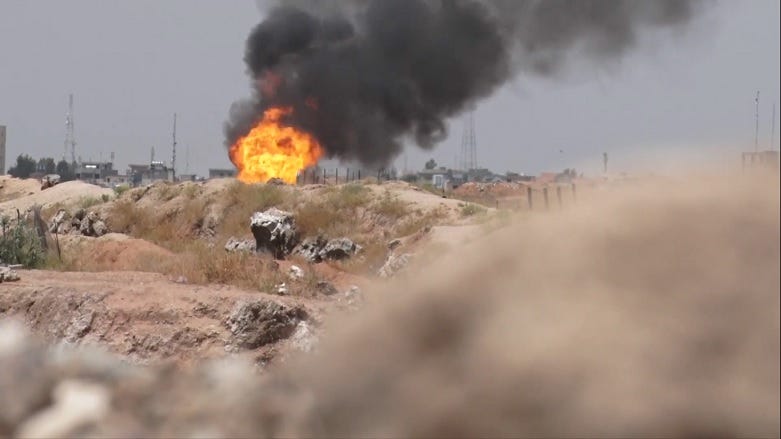Climate Change as Foreign Policy
Biden’s efforts could produce improved ties in unexpected places like Iraq
Let’s take a slightly longer walk than usual and go beyond the immediate crises of the moment – the turmoil in America’s democracy and a raging pandemic – and climb up to look at the wider landscape in the world. Here, up above the clouds of truth decay in angry social media debates, one issue looms large: a heating planet on the cusp of producing unstoppable changes to the physical landscape.
Last year tied the hottest year on record. Hardly a week goes by without another warning backed by science and evidence about how these trends are already changing the world we live in with signs of more dramatic changes to come in our lifetimes.
These trends are changing public attitudes in a major way. Here in America, a strong majority of Americans now support new public policy measures in line with what the incoming Biden administration has proposed to move the country’s economic and energy models into the future. Backing for climate policy action is stronger among younger Americans – they get that their own future is at stake. In research conducted in 2019, my colleagues and I found that a majority of Millennial and Generation Z Republicans see climate change as a very important issue in a broader study on voter attitudes on a range of security questions.
This shift in the discussion underway in America is mirrored in other places around the world. In the part of my work that focuses on the Middle East, I have seen a noticeable shift among people in that region about the growing challenges linked to a changing climate.
A few months ago, Fareed Yasseen, Iraq’s ambassador to the United States, invited me to lunch and started an ongoing conversation on how climate change is already impacting his country. Ambassador Yasseen, schooled as an engineer and scientist with a doctorate in physics, has a strong background on the issues of climate change. In the late 1990s, Yasseen worked with the United Nations Secretariat on Climate Change. In recent years, he worked inside his government to prioritize climate policy, including Iraq’s accession to international climate agreements.
Yasseen’s work on climate change is driven by practical realities in the country he represents. Last summer, Baghdad saw record high temperatures as part of an extreme heat wave that baked many parts of the Middle East. In southern Iraq, the practice of flaring natural gas that poisons the air has prompted a debate about new environmental practices and ways to make policy shifts to use that gas to power millions of homes.
That’s why Iraq’s ambassador to the United States was pleased to hear that the incoming Biden administration has big plans to prioritize climate policy in its foreign policy. President-elect Biden is filling his incoming White House team with figures who know the climate issue well, and his climate envoy, former Secretary of State John Kerry, is building an impressive team to work with him at the State Department. The Iraqi ambassador sees the possibilities in these moves - that they represent an avenue to deepen U.S.-Iraqi relations in the long-run.
It should come as no surprise that Biden’s foreign policy will prioritize climate change given the trends in the world and the impact it is already having on the global economy, migration, and conflict. Last year, John Podesta and Todd Stern outlined a framework for how to best integrate climate into America’s foreign policy, and experienced climate diplomacy hands like Alan Yu have charted out a plan for how America can restore its global leadership in climate policy that goes far beyond just rejoining the Paris Climate Accords.
My discussions with Yasseen gave me a new perspective about how the United States could work to update its engagement in tough parts of the world like the Middle East. Today’s debate on U.S. policy in the Middle East is dominated by empty slogans like “end endless wars” and obsessively tactical debates that parse the number of U.S. troops in a particular country – it’s like the discourse remains stuck somewhere in 2005. The cliché that generals always fight the previous war seems mirrored by U.S. foreign policy commentators.
Opening a bilateral discussion between the United States and Iraq on the impact of climate change and ways to advance a global energy transformation would be a more future-centric approach to thinking about U.S. policy in the Middle East. With Iraq, the United States could discuss ways to expand cooperation on the energy and environment front and do so in a way that helps Iraqis transform their economic model and builds opportunities for U.S. companies in new energy industries.
This is a discussion that the United States could have with other countries in the region, too. Water security in places like Egypt and Iran are issues that affect the lives of millions of people – and enhancing climate policy in U.S. diplomacy could open the door to new conversations that are not narrowly focused on the rulers of these countries but also with the broader population. Some think tanks have examined this issue – like this interesting set of papers published by the Century Foundation on nature and national security in the Middle East.
If the Biden team wants to succeed in its efforts to prioritize climate change in its foreign policy, it should not only focus on big countries like China and India -it should also look for ways to construct a future-oriented conversation with countries like Iraq.



